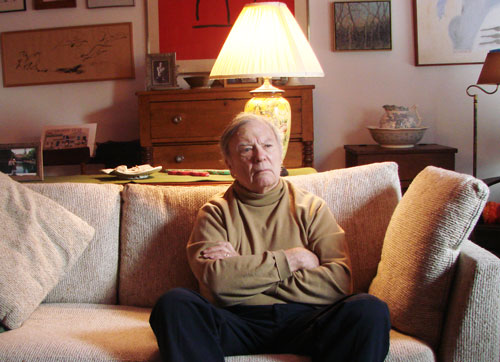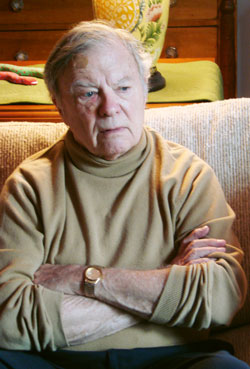An Interview with Hilary Masters, Pittsburgh Man of Letters
by Robert Isenberg / January 4, 2013 / No comments
Hilary Masters is one of the most respected names in Pittsburgh letters. Raised in Kansas City, Missouri, Masters spent some years in New York City before settling in Pittsburgh. He is a Navy veteran, and erstwhile press agent and freelance photographer.
But Masters is best known for his expertly crafted books, such as In Rooms of Memory (essays) and How the Indians Buried Their Dead (short stories). He has also spent 30 years teaching at Carnegie-Mellon University, where he has long hosted literary events. His latest book is Post (BkMk Press), a wildly satirical novel begun in the late 1970s. In December I spoke with Masters in his elegant home on the Mexican War Streets, where he lives with his wife, the playwright and novelist Kathleen George.
In this interview Masters talks about Pittsburgh’s literary scene when he first came to the city, his take on emceeing readings, his latest book, and why writing recommendation letters is terrifying to him.
You have been in Pittsburgh for a long time. Writers can theoretically live anywhere, so why Pittsburgh?
I think the thing about Pittsburgh is that it’s a great city. But you have to like cities. A lot of people don’t like cities, they like to live in the suburbs, or the country. But I do like them. I was raised in Kansas City and New York City, so I knew all about cities. Pittsburgh has that certain quality of life, that mix of people and jobs and neighborhoods—neighborhoods especially. It has a history that goes back. It’s comfortable for me to be here. And it may be true for other writers, too. There are a lot of wonderful facilities. It’s an easy trip into New York. I just like it. And there’s a lot of other writers, here. It’s kind of a writers’ city.
You’ve lived in the city since 1983. How have you seen the literary culture in Pittsburgh evolve?
When I got here it was already pretty much evolved. People like Chuck Kinder, for example, were central to the writing community. He always had these great parties. That’s where I met Kathleen [George], actually, at one of these parties. I kept running into her all the time. I said, “Who is that beautiful, dark woman I see at Chuck Kinder’s all the time?” And she was always bringing these wonderful foods, because she’s of an Arabic background, so I knew she was a good cook. [Laughs] It always had a festive quality, writers getting together.
You’ve written about living in New York in the 1950s. That was a very collaborative time, but many writers like to live and work alone. Where do you fall on the social spectrum?
I teach—I enjoy that—and I do my own work. So the social part of it is not the big thing for me. Although I enjoy it, I enjoy the people, and I like the friendship, I like my own work being my own thing. That and school. We’re just going through the end of the semester now, so I’m writing recommendations for students for graduate school, which terrifies me. I’m a very poor speller, and I’m always terrified I’m going to make an awful gaffe on a letter or recommendation. I enjoy working with young students—most of them.
How would you describe the reading culture right now?
I don’t go to it as much as I used to. When I first came here, I used to go to readings religiously, because I felt it was part of my job. But I don’t do that as much as I used to. I don’t know why. They seemed to get along without me.
You have introduced countless readings in the past. How do you feel about the role of emceeing?
I’m a little uncomfortable with it. I wonder sometimes: Who am I introducing, myself or the guest? It makes me worry a little bit. But if there’s people that I know, or I’ve known for years, it’s kind of fun doing it.
What, to you, makes a very strong literary reading?
I prefer, in a reading, that somebody just opens up the book and reads it, to the best of his or her ability. I get very nervous when people start going off and becoming characters themselves. I think the best reading is just a very flat reading. Let the material speak for itself.
What do you feel is missing or could be improved in the Pittsburgh literary environment right now?
Geez, wow, what a question. I can’t think of anything that’s missing. I guess, to be facetious, I’d say more money. I think if we could have more parties at these readings, it would be fun. Make it more of a social event. Parties to which the students would be invited. We have trouble with that, of course. Many of the students are underage, so they’re not allowed to drink, and so forth.
Each university has its own reading series, but there isn’t much crossover among attendants. Chatham students don’t go to CMU readings, and vice versa. Could that be improved?
I think it could! Of course the more people meeting each other, the better. The issue there is that Chatham’s really just getting going. The school is new at public readings. They’re just getting feelers out, and becoming aware that they are a platform. But I think the more, the merrier. There isn’t much of an exchange, even with Pitt, even though we know a lot of the writers. We go to their readings, some of them come to ours. You raise a very interesting question, thinking about it. There should be more exchange than there is, for sure.
You have a very diverse body of work. You’ve written essays, fiction. Kathleen as well. How do you feel about experimentation as a writer? Trying new avenues?
What do you mean by experimentation?
Your last novel, Post, is a great example. It’s surreal, it’s very different. A lot of people were very surprised by that. You’ve tried a lot of new things for the first time.
Well, it keeps me interested. I think there are subjects that haven’t had their own particular kind of venue, and they have to be told in a way that accords the subject. Maybe that’s experimentation, I don’t know. I just go with the flow, as they say. Whatever kind of voice seems appropriate or contributes to the subject. For my little pigeon book, I had to take a different voice entirely than I’ve ever done before. But experimentation just for its own sake is—I don’t know—indulgent. In a bad way. I’m so ingrained in the old school, I suppose. Anything that strays from the typical kind of narrative makes me a little uneasy, unless there is a genuine connection with the narrator, with the story, with the subject.
Your wife tried crime fiction very recently, and she said you were very supportive when she described her project. How did you feel when she tried something so new?
I though it was exciting. Great. Wonderful. I mean, aren’t we supposed to be kind of inventive? And I think she does a wonderful job.
You’ve been working for universities for a long time. Is there anything unique, or even restrictive, about the university setting?
Well, there’s a paycheck. I mean, that’s not to be dismissed. That’s really important. That’s how I got into it, doing visiting writers’ gigs, some of which led to long-term connections, longer appointments and so forth. And then I came here.
You have a beautiful house, and it feels very lived-in. Could you tell us a little about it?
I bought the house in ’83, and I moved in in ’84. And Kathleen came later. When I came to Pittsburgh, I was undecided as to whether I wanted to stay. Carnegie-Mellon called me and asked me to join them, and I said, “Well, let’s see if we like each other. Let’s try it for a year,” or something like that. Normally, what I’d do—when I would get into a different environment—was go out and deliberately get myself lost, driving around, and get used to the place. So one day I was driving around Pittsburgh, and I came to this area of the Northside, and it reminded me so much of the West Village in New York, I felt immediately at home. The building was built around the same time as houses in the West Village, actually. This house was built in eighteen-fifty-something. I felt very much at ease here, so that’s why we ended up here, mainly. I was duplicating a kind of environment that I was comfortable with in New York.






